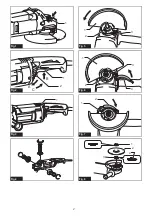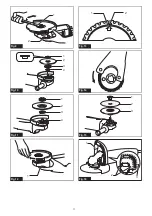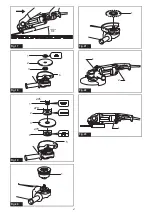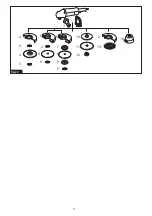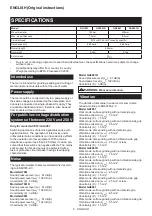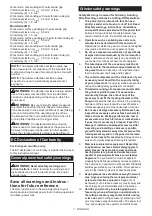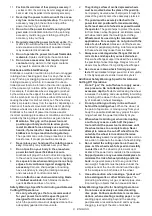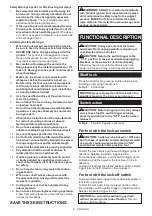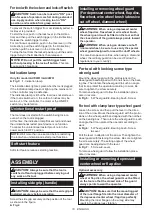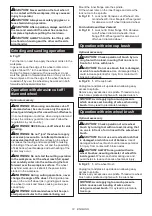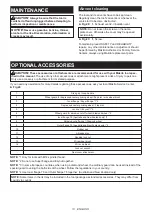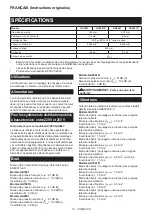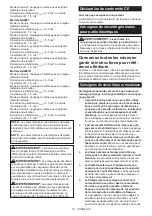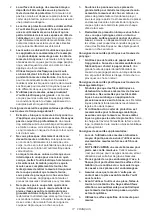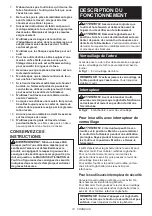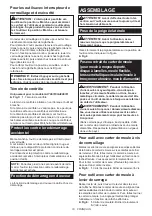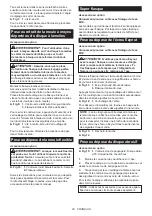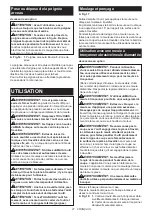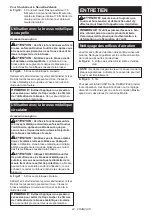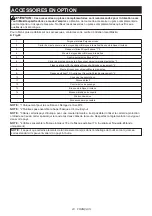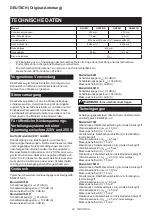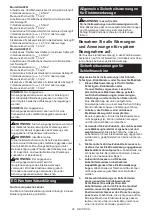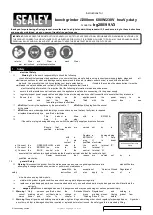
10 ENGLISH
For tool with the lock-on and lock-off switch
CAUTION:
Switch can be locked in "ON" posi-
tion for ease of operator comfort during extended
use. Apply caution when locking tool in "ON"
position and maintain firm grasp on tool.
To prevent the switch trigger from accidentally pulled, a
lock lever is provided.
To start the tool, push in the lock lever (in the A direc
-
tion) and then pull the switch trigger (in the B direction).
Release the switch trigger to stop.
For continuous operation, push in the lock lever (in the
A direction), pull the switch trigger (in the B direction)
and then pull the lock lever (in the C direction).
To stop the tool from the locked position, pull the switch
trigger fully (in the B direction), then release it.
NOTICE:
Do not pull the switch trigger hard
without pressing in the lock-off button.
This can
cause switch breakage.
Indication lamp
Only for model GA7061R / GA9061R
►
Fig.3:
1.
Indication lamp
The indication lamp lights up green when the tool is plugged.
If the indication lamp does not light up, the mains cord
or the controller may be defective.
The indication lamp is lit but the tool does not start even
if the tool is switched on, the carbon brushes may be
worn out, or the controller, the motor or the ON/OFF
switch may be defective.
Unintentional restart proof
The tool does not start with the switch being lock-on
even when the tool is plugged.
At this time, the indication lamp flickers red and shows
the unintentional restart proof device is on function.
To cancel the unintentional restart proof, return the
power switch to OFF position.
NOTE:
Wait more than one second before restarting
the tool when unintentional restart proof functions.
Soft start feature
Soft start feature reduces starting reaction.
ASSEMBLY
CAUTION:
Always be sure that the tool is
switched off and unplugged before carrying out
any work on the tool.
Installing side grip (handle)
CAUTION:
Always be sure that the side grip is
installed securely before operation.
Screw the side grip securely on the position of the tool
as shown in the figure.
►
Fig.4
Installing or removing wheel guard
(For depressed center wheel, flap disc,
flex wheel, wire wheel brush / abrasive
cut-off wheel, diamond wheel)
WARNING:
When using a depressed center
wheel, flap disc, flex wheel or wire wheel brush,
the wheel guard must be fitted on the tool so that
the closed side of the guard always points toward
the operator.
WARNING:
When using an abrasive cut-off
/ diamond wheel, be sure to use only the special
wheel guard designed for use with cut-off wheels.
(In some European countries, when using a diamond
wheel, the ordinary guard can be used. Follow the
regulations in your country.)
For tool with locking screw type
wheel guard
Mount the wheel guard with the protrusions on the
wheel guard band aligned with the notches on the bear
-
ing box. Then rotate the wheel guard to such an angle
that it can protect the operator according to work. Be
sure to tighten the screw securely.
To remove wheel guard, follow the installation proce
-
dure in reverse.
►
Fig.5:
1.
Wheel guard
2.
Bearing box
3.
Screw
For tool with clamp lever type wheel guard
Loosen the screw, and then pull the lever in the direc
-
tion of the arrow. Mount the wheel guard with the protru
-
sions on the wheel guard band aligned with the notches
on the bearing box. Then rotate the wheel guard to such
an angle that it can protect the operator according to
work.
►
Fig.6:
1.
Wheel guard
2.
Bearing box
3.
Screw
4.
Lever
Pull the lever in direction of the arrow. Then tighten the
wheel guard with fastening the screw. Be sure to tighten
the screw securely. The setting angle of the wheel
guard can be adjusted with the lever.
►
Fig.7:
1.
Screw
2.
Lever
To remove wheel guard, follow the installation proce
-
dure in reverse.
Installing or removing depressed
center wheel or flap disc
Optional accessory
WARNING:
When using a depressed center
wheel or flap disc, the wheel guard must be fitted
on the tool so that the closed side of the guard
always points toward the operator.
CAUTION:
Make sure that the mounting part
of the inner flange fits into the inner diameter of
the depressed center wheel / flap disc perfectly.
Mounting the inner flange on the wrong side may
result in the dangerous vibration.


